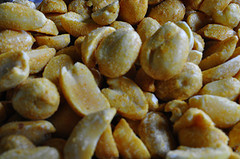FDA Proposes New Food Safety Rules In Wake Of Peanut & Cantaloupe Contamination
In what the FDA describes as “the most sweeping changes to the nation’s food protection system since Theodore Roosevelt held office,” the agency sets out new rules for farmers, food producers and processors, and importers.
The two rules — there will ultimately be five, see below — that have been published for public comment are:
Preventive Controls for Human Food
This rule will require food facilities to implement “preventive controls,” a science-based set of measures intended to prevent foodborne illness.
Most of the more than 166,000 registered food facilities in the country will need to provide a written plan that does the following:
– Evaluates hazards that are reasonably likely to occur in food, such as pathogens (disease-causing organisms) and allergens.
– Specifies the steps that will be put in place to minimize or prevent those hazards.
– Specifies how these controls will be monitored.
– Maintains routine records of the monitoring.
– Specifies what actions will be taken to correct problems that arise.
Produce Safety:
This rule proposes standards for growing, harvesting, packing, and holding produce on farms, especially in the following areas that are known to be possible conduits for contamination:
– Irrigation and other agricultural water
– Farm worker hygiene
– Manure and other additions to the soil
– Intrusion of animals in the growing fields.
– Sanitation conditions affecting buildings, equipment and tools
The proposed rule also includes additional provisions applicable to the growing, harvesting and packing of sprouts, which are more vulnerable in their growing environment to harmful bacteria.
The rules still to be published are:
Foreign Supplier Verification for Importers: Will require importers to verify that foreign suppliers are following procedures that provide the same level of health protection as that required of domestic food producers.
Accredited Third Party Certification: The accreditation of third-party auditors would help ensure that food producers in other countries comply with U.S. food safety laws. Many of these concerns were highlighted in a recent, in-depth Bloomberg article.
Preventive Controls for Animal Food: The FDA recently began testing animal food for possible contaminants. This rule will implement preventive controls at animal food facilities that are similar to those proposed for human food.
“We look forward to analyzing FDA’s proposals,” says Jean Halloran, Director of Food Policy Initiatives at Consumers Union. “These rules really go to the heart of the problems we’ve had with food safety in recent years. The produce rule should take aim at serious problems like the 2006 outbreak of E. coli in spinach, which caused several deaths. The ‘preventive control’ rule should help put a stop to incidents like the salmonella outbreaks at the Peanut Corporation of America in 2009, which killed nine people, and the Sunland plant last year, which left hundreds of people sick.”
Ami Gadhia, Senior Policy Counsel for Consumers Union, said, “Under the old rules, we’ve been reacting to food contaminations after they happened. The goal here is to prevent deadly outbreaks before people get hurt. We’re anxious to dive deep into these proposed rules so we can review and comment on the details.”
Last year, food safety advocates filed a lawsuit against the FDA because it was long overdue in announcing any of these rules.
At the time, the FDA claimed it was more important to get the rules right than it was to meet the deadline set by the Food Safety Modernization Act. “[T]here is no indication that Congress believed that strict adherence to those timetables is more important than careful consideration and development of these complex regulations,” explained the agency in its motion to have the lawsuit dismissed.
Want more consumer news? Visit our parent organization, Consumer Reports, for the latest on scams, recalls, and other consumer issues.


